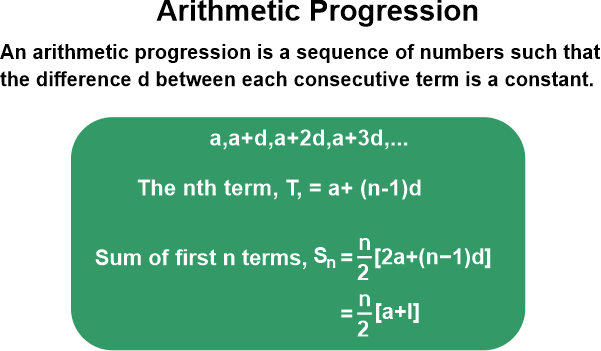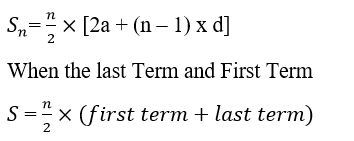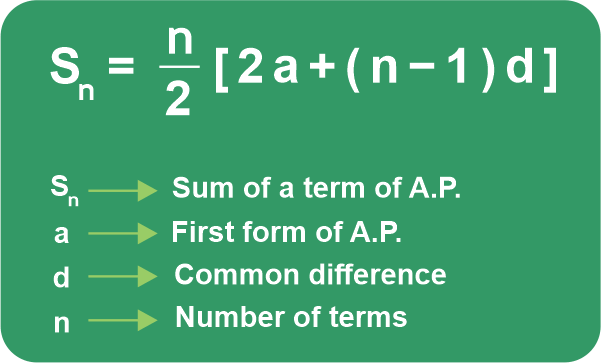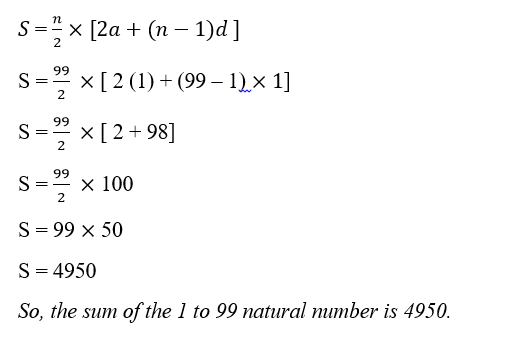What is the Sum of all Numbers from 1 to 99?AP is a sequence of numbers in which the difference between the two consecutive numbers is a constant value. For example, the series of natural numbers 1,2,3,4,5,6,8,... . The series has a common difference, and it is . Notations are used for denoting Arithmetic Progression. 
Types of ProgressionIn mathematics, there are three types of Progression exist, and they are:
Arithmetic Progression is denoted by the notation AP. Notations Several Notations are used in the Arithmetic Problems, and they are: The sum of the First n terms,Sn First Term = a Common difference = d First Term = (a) nth term =an These terms show the property of the Arithmetic Progression. First Term of arithmetic progression The AP can also be presented in the form of common differences, which are as follows. a,a+d,a+2d,a+3d,a+4d ,....a+(n-1)d Here the "a" represents the first Term. a1= a a2= a + d a3= a + 2d The common difference in the AP In a series, the given are common differences: the nth Term and the first Term. Suppose the Progression begins like a1, a2, ....an. a2-a2= d The common difference can be negative, zero, or positive. The General Form of APTerm Position = 1 Representation of terms: a1 Value of the term = a = a + (1 - 1) d Term Position: 2 Representation of n terms = a2 Values of the term = a +d = a + (2-1) d = a + d Term Position = 3 Representation n of terms = a3 Values of the term = a + (3 ' 1) d = a +2d Term Position = 4 Representation of the Term = a4 Values of the term = a + 3d = a + (4 - 1) d Formulas for the Arithmetic ProgressionTwo major formulas are used in the Arithmetic Progression, and they are related to
The formula for the nth Term an =a+(n-1)d Here, an= nth Term First Term = a Common difference = d Number of terms = n Different Types of AP
The Sum of an n TermsSuppose an arithmetic progression containing "n" terms 
Proof MethodSuppose an arithmetic progression contains "n" terms, and they are in sequence a, a + d, a + 2d, ....., a + (n -1) x d. Sum of first n terms = a, a + d, a + 2d, ..., a + (n ' 1) d ----------- (1) Reverse order Sn=[a+(n-1)×d] + [a+(n-2)×d] + [a+(n-3)×d] +...(a)- - - (ii) Addition of equations of the above equations 2Sn = [ 2a + (n -1) × d] + [2a + (n -1) x d] + [2a + (n -1) x d] ...... + [ 2a + (n -1) x d ] ( n terms) 2Sn = n x [ 2a + (n ' 1) x d] 
Question: What is the sum of all numbers from 1 to 99? 
Ans:1, 2, 3, 4, 5, 6, 7, 9.... , 99 1 = a = First term of the series 1 = d = the common difference 99 = n = the total number of terms To find the sum, we will use the formula 
Next TopicNumber Name 1 to 50 in English
|
 For Videos Join Our Youtube Channel: Join Now
For Videos Join Our Youtube Channel: Join Now
Feedback
- Send your Feedback to [email protected]
Help Others, Please Share










